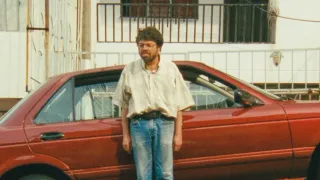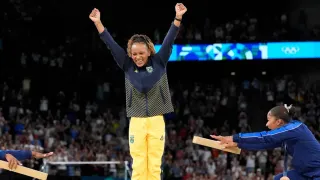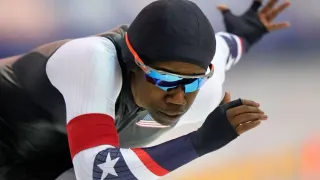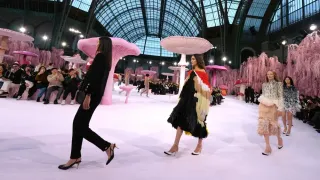March 9, 2017
Asian Perspectives in North America
David Lamble READ TIME: 4 MIN.
It's officially known as CAAMFest, but you may remember it as the San Francisco Asian American Film Festival. The festival, which embraces films, food and music, includes an LGBTQ shorts program and an Opening Gala at the Asian Art Museum. The films (March 9-19 at venues including the Castro, the Roxie, the Alamo Drafthouse and Oakland's New Parkway) commence with an English-language narrative loaded with same-sex subtext.
The Tiger Hunter Lena Khan's first feature begins with an Indian man shooting a tiger and achieves pop warp-speed when the man's son makes plans to immigrate to America to put his engineering degree to its best use. Sami (Danny Pudi) discovers that his Indian degree only qualifies him for a spot in a single-room flat, sharing a bed with other overqualified Indian lads. With an accomplished supporting cast including "Napoleon Dynamite"'s Jon Heder. (Opening night, Castro, 3/9)
Re: Orientations Canadian filmmaker Richard Fung revisits the subject of his historic 1984 portrait of queer Asian Torontonians and demonstrates the profound changes wrought on the social landscape of a nation often lauded for its tolerance and openness. The film is a breezy time capsule for LGBTQ persons of a certain age, hobbled only by its omission of the role played during this era by the onetime national queer newsmagazine "The Body Politic." (Roxie, 3/12)
95 and 6 To Go Meet Tom Takesue. By the time granddaughter Kim Takesue's intimate portrait is over, you may feel close to the loquacious and still agile Japanese American widower still mourning his wife of over half a century. Framed by the astonishing beauty of his Hawaiian retirement cottage, the old guy doesn't take himself too seriously and has some refreshingly candid memories of his late wife. (New People, 3/19)
Guangzhou Dream Factory Christiane Badgley visits this bustling mainland Chinese city exploring longstanding trade ties between unlikely partners. Badgley uncovers some factoids: That these trading patterns overwhelmingly favor Chinese economic interests over those of rising African powers like Nigeria; that the China-Africa economic axis seems to have discouraged the building of factories and a modern industrial infrastructure in Africa; and that there is resentment building among middle-class Africans that may express itself in the near future. (New Parkway, 3/18)
Out/Here This year's edition of CAAMFEST's queer shorts program includes contributions from the U.S., Canada and Indonesia. (Roxie, 3/11) Includes:
Two-Sided Ride In a shade under nine minutes, Canadian Jason Karman puts us inside the daily work life of Alex (Brent Hirose), a young Vancouver, BC Uber driver. There are the expected hazards: Nagging, brazenly rude passengers and backseat upchuck, along with unexpected treats like the attractive curly-haired young yoga teacher Oscar (Christopher Webb), who agrees to sit upfront next to the clearly aroused Alex. Both amusing and accurate to a fault in depicting a hazardous profession in the so-called "sharing economy."
The Book of Living & Dying Sara Yang opens her Manhattan-set drama with her subject hallucinating about sounds penetrating the walls of her flat. Her friend is becoming exasperated with her crazed companion.
"Did you take your pills this morning?"
"What pills?"
"The pills you're supposed to take every day."
"Oh, that."
It's a nifty adaptation from a play of the same title about a subject that many of us are all-too-familiar with. The story benefits from its opening up, at one point putting its agitated protagonist on a downtown-bound subway train.
Escaping Agra Pallavi Somusetty's short doc relates the struggles of 19-year-old UC Davis student Naveen Bhat to come out to a conservative, foreign-raised mother. "My mother is very confused about lesbian sex. I'm not a lesbian. I don't even identify as a girl. I'm non-binary, in turns masculine and not so attracted to women, but my mother refuses to acknowledge that, so lesbian it is."
The film combines the personal story of its Indian-born protagonist with a slice of Bhat's standup comedy act. When Bhat's mom discovered her child's emerging sexual identity, she confiscated all her electronic toys. This is very much a life-in-progress.
NU'O'C In Quyen Nguyen-Le's short, a Vietnamese-American lesbian finds herself in a prickly discussion with an American-raised lover. The young women are standing side-by-side in a dark room.
"Dude, Vietnam was such a mistake."
"Vietnam's a country, not a war. You just ignored all Vietnamese people."
"All I'm saying is we shouldn't have been there."
"We weren't there. It was a real thing that happened to real people like my mom. Don't idealize it."
This short benefits from its five-minute running time. A pointed discussion doesn't get lost in the thick of a heavily-plotted, full-length romance. NU'O'C is promising enough an effort that one is curious to see where a full-length version might go. The Vietnamese title translates as "Water/Homeland."
Who Killed Vincent Chin? The festival presents an encore screening of this provocative 1987 documentary. The film covers the controversy that erupted when young Chin was murdered by persons allegedly upset by the loss of American auto-manufacturing jobs to the growing Japanese industry. (Gray Area, 3/11)
Faster, Pussycat! Kill! Kill! Asian actors Tura Satana and Haji are featured in this pioneering full-length porn classic from director Russ Meyer. (Alamo Drafthouse, 3/15)
The Chinese Exclusion Act Ric Burns and Li-Shin Yu tackle the complicated subject of the heinous bias against Chinese immigrants to this country, expressed in a thick stack of laws. (Closing night, Castro, 3/19)
Info: caamedia.org.






